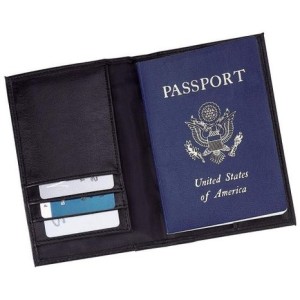Getting ready for your first business trip abroad can be very stressful! I’ve put together a comprehensive list of items that can 
help you prepare, hopefully cutting down on your anxiety. This is the first installment.
When I found out that I would be taking my first international business trip I was both excited and nervous. I was excited to go to a place I had never been before (Manila), plus excited about all the points I would be racking up. I was nervous about all the questions I didn’t have answers to. How would I deal with language barriers to get to my destination? Do I need to have vaccinations? What should I wear? And the list goes on. Between online research, working with my travel department, and asking everyone I could think of who may have experience (friends, family, coworkers) I was able to get through the trip without any major hiccups. I’ve been back to Manila several times over the years, and feel much more comfortable making the long trek now. I’ve put together this list of things you should do before your first international business trip to hopefully help you avoid some of the learning pains I had on my first trip.
Passport. First and foremost, make sure you have a passport. If you don’t have one you need to act quickly as it takes 4-6 weeks to get your passport using the normal route. You may consider getting a passport even if you don’t have an international business trip scheduled. It will save you a lot of headaches down the line, and since they last 10 years you won’t have to renew it any time soon. If you have an international business trip come up and you need it faster there are ways to expedite the process but be prepared to pay fees. Check to see if your company will reimburse you for the expense—I wouldn’t be surprised if they did since it’s a business expense.
If you have a passport already and haven’t traveled in a while check the expiration date. They last 10 years for adults, but time seems to fly by sometimes and the expiration may sneak up on you. You can renew here.
Finally, be sure you add your passport to your packing list! You may think it’s a given that you’ll remember your passport just like you would remember your wallet, but I don’t take it with me on domestic travel. It’s because of this that it’s possible to forget…which I have done! Boy was that a stressful day.
You should be able to get answers to many questions you may have on the U.S. State Department website site, which is surprisingly helpful and easy to use.
One side note, if you are driving to Canada or Mexico for business and don’t plan to fly internationally you should consider just getting a U.S. Passport card. It’s cheaper and will fit in your wallet like a drivers license.
Travel Advisories. It’s not out of the question that there could be a travel advisory wherever you’re traveling. Before my recent trip to Manila the Home Warrior checked the US State Department travel advisory website and the Philippines had a travel warning due to terrorist and insurgent activities. Yikes! After the Home Warrior had a mini freak out we looked closer at the warning and realized the problems were not happening near Manila. That doesn’t mean that one shouldn’t be on guard. I don’t go out at night there, I stay at the best hotel with the highest security (which is a very short distance from where I do business) and if I go shopping during the day I always go with a group of people. In your destination it may be advised to not even go out to shop or go to a local restaurant, so be sure to do your homework and lean on your travel department (if you have one) for advice. Also if someone in your company has recently traveled where you are going you may want to chat with them before you leave. If you don’t know anyone ask your travel department to recommend someone. If that doesn’t work, online forums are often a good source of information.
The travel advisory site can alert you for many other things, such as typhoons. Last year I was in Manila when the devastating Super Typhoon Haiyan was barreling towards the Philippines. You never know what can happen when traveling internationally so take some time to read through any potential travel advisories to ensure your safety.
Vaccinations. The Centers for Disease Control recommends you have routine vaccines regardless of whether you travel or not. The list of vaccines can be found here. It’s recommended you visit your doctor to discuss your travel about 4-6 weeks ahead of your trip so that your vaccines will work, and because some vaccines require more than one dose. However, what about other vaccinations recommended based on where you’re traveling to? Be sure to always check with your doctor, and you can find out more information based on your specific travel location here.
Next week we’ll cover Food, Transportation, and Language for international trips.
Readers, what do you recommend first-time international business travelers do to prepare? Any crazy stories from your first work trip on foreign soil?
****************************************************************************
Have a travel question or suggestion? Send it to RoadWarriorette @ gmail.com.
Follow Road Warriorette on Twitter, Facebook, and Pinterest!
This post may include affiliate links. Thanks for your support!




Well, I probably have to wait to see the next installments but there is much more to add to this list. How about visa? Credit card/debit card password to access ATM? Mobile phone SIM card that works in another country? Then, unless I am staying for a month on a foreign country I only bring a carry on with me. Remember, this is a business trip and you don’t want to be the one checking luggage or causing delays to meetings, etc… because you lost your luggage. Also, book a hotel car from the airport. Do not get a taxi outside the terminal mainly if you are visiting countries you are not familiar with. It may cost more but it is a business expense and your safety comes first.
Good tips. I also copy my passport and email it to myself or store an image in the cloud as well as the credit cards I carry.
I also like the passport card. Not only does it look cool but I carry it with me ashore on cruises. That way I have a somewhat version of my passport that I leave in the ship safe just in case. Plus it’s waterproof.
@Santastico oh yes many more installments. Those are great tips and I will be sure to include them!
@DaninSTL Love that tip about emailing yourself a copy of your passport. Super smart.
@DaninSTL: I use Dropbox to store a PDF version of all my documents and credit cars. I can easily access those on my phone or on any computer that has internet access. I also keep a copy of my airline ticket, hotel and car reservations, etc.. on a Travel folder inside Dropbox so it is easy to find what I need.
My company has a group within HR that handles international travel (i.e. flight booking, work visa, etc.) so I would first advise readers to see if their company has a similar team that can help them. I’d say getting the work visa is probably the most important since the immigration folks will always look for that in your passport if you write that you’re there for business.
Spend a couple of hours surfing the internet to get the “lay of the land”. Find out where your hotel is, where your meeting place is. See what the restaurant, food store, shopping, exercise options are near where you’ll be. Read about safety concerns, tipping traditions, “must-see” sights. It feels so much less overwhelming if you have a mental picture of where you are / where you’re going when you get there.